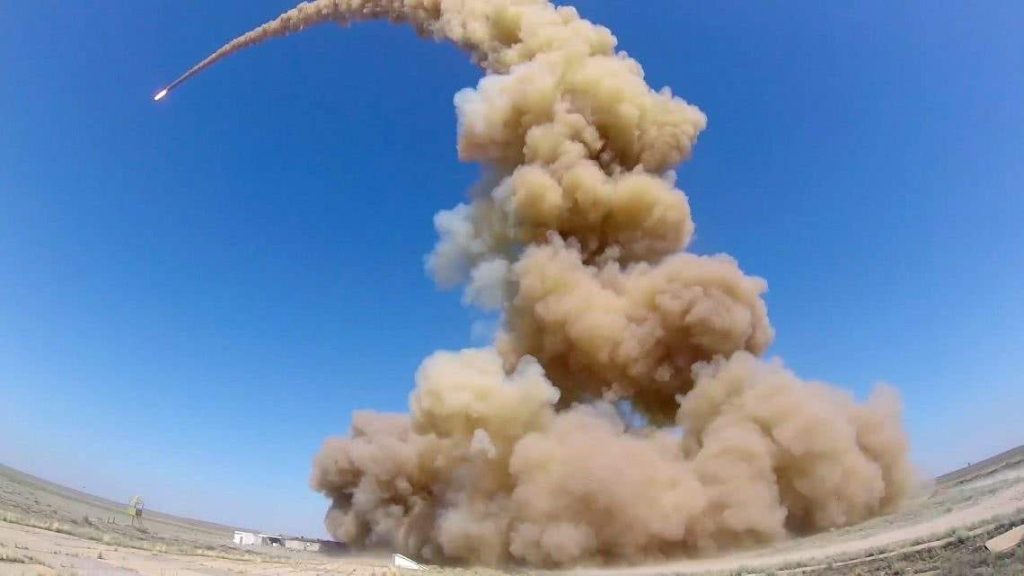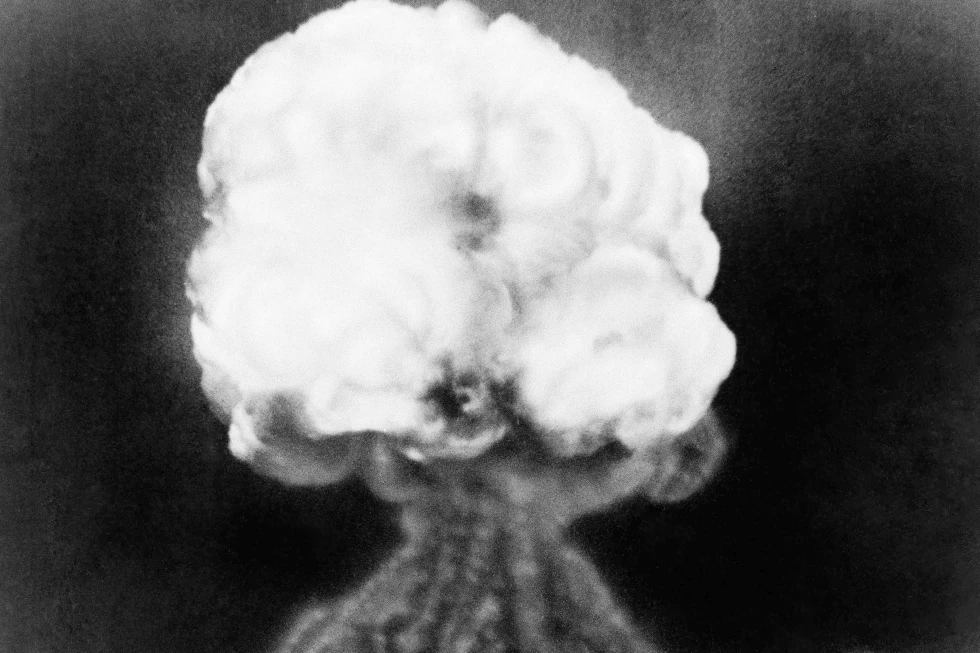In a show of solidarity and determination, New Mexico Attorney General Raúl Torrez, alongside 13 other prominent prosecutors hailing from various parts of the United States, has pledged their unwavering support for the crucial cause of compensating individuals adversely affected by radiation exposure during nuclear weapons testing.
In a letter addressed to congressional leaders, the group of Democratic officials passionately implored the federal government to step up and acknowledge the sacrifices made by these brave individuals.
The letter specifically highlights the estimated half a million people who resided within a 150-mile radius of the Trinity Test site in southern New Mexico, the very location where the world was forever changed by the detonation of the first atomic bomb in 1945.
Furthermore, it sheds light on the plight of thousands of individuals residing in Idaho, Colorado, Nevada, Utah, Arizona, Montana, and Guam, who are currently excluded from the existing compensation program.
With an unwavering belief in the importance of justice and compassion, these prosecutors are resolute in their quest to ensure that those who have suffered are not forgotten and are rightfully provided the support they so desperately need.
In a significant legislative development, the U.S. Senate, the upper chamber of Congress, has recently taken a notable stride by voting to expand the Radiation Exposure Compensation Act (RECA) as an integral component of an extensive defense spending bill.
This crucial move has garnered widespread support from various quarters, with proponents eagerly anticipating the inclusion of these provisions in the version of the bill that will be presented in the U.S.
House of Representatives, the lower chamber of Congress. Furthermore, this positive development has received a boost in momentum as President Joe Biden himself has publicly expressed his unwavering support for this expansion.
This confluence of support from the Senate, the House, and the President signifies a remarkable step forward in the ongoing efforts to address the numerous issues associated with radiation exposure and provide much-needed compensation to those affected.
In a statement, Torrez expressed the belief that the moment has finally arrived to rectify a significant historical injustice.
This sentiment was prompted by the release of the highly acclaimed summer film “Oppenheimer,” which delves into the top-secret Manhattan Project and the birth of the nuclear era amidst the backdrop of World War II.
The movie has generated renewed interest in a longstanding endeavor to expand compensation for those families who were exposed to the fallout from these nuclear activities and continue to endure the enduring consequences of related illnesses.
This newfound attention has shone a spotlight on the ongoing struggles faced by these individuals and has further underscored the urgent need to address their plight.
The topic at hand strikes a personal chord for Torrez, as he has a deep connection to the area where the Trinity Test took place.
During his summers, he would make the journey to southern New Mexico to visit his grandmother, who resided approximately 70 miles away from the site of the detonation.
Little did she know, as she utilized rainwater from her cistern for everyday tasks such as cooking and cleaning, that it was highly probable that the water had become tainted as a direct consequence of the explosion.
This unfortunate reality brings forth a sense of concern and reflection for Torrez, as he contemplates the potential long-term effects of such contamination on his grandmother’s health and the overall well-being of the community in which she lived.

The proximity of this event to his own experiences evokes a profound sense of empathy and a desire for further investigation into the lasting consequences of nuclear testing on both the environment and human health.
The attorneys general who have affixed their signatures onto Torrez’s letter hail from a diverse array of jurisdictions, including Arizona, Colorado, Connecticut, Delaware, Maryland, Minnesota, Nevada, New York, Pennsylvania, Oregon, Rhode Island, Vermont, and the District of Columbia.
This impressive roster of legal representatives demonstrates a widespread recognition and concern for the issues raised in Torrez’s letter, which undoubtedly hold significant implications for the jurisdictions they represent.
By joining forces and lending their collective support, these attorneys general are sending a powerful message that the matters at hand transcend individual state boundaries and necessitate a unified front in addressing them.
This collaborative effort is a testament to the shared commitment of these legal professionals to upholding the principles of justice, fairness, and the rule of law, and it underscores the importance of addressing the challenges outlined in Torrez’s letter in a comprehensive and coordinated manner.
During the proceedings, the attorneys meticulously presented the findings of a highly esteemed team of researchers, who conducted an extensive study on the mapping of radioactive fallout resulting from nuclear weapons tests conducted within the United States.
The investigation commenced with the groundbreaking Trinity Test in 1945, and proceeded to encompass the various detonations that transpired in New Mexico and Nevada between the years 1945 and 1962.
The comprehensive model developed by these researchers revealed a disconcerting reality: the aforementioned nuclear explosions had precipitated a pervasive and far-reaching contamination of radioactive materials.
Notably, the Trinity Test emerged as a significant contributor to the heightened exposure levels experienced by the residents of New Mexico.
The insidious effects of the fallout were not confined to a singular geographical region, as its pernicious reach extended to encompass 46 states within the United States, as well as certain areas in Canada and Mexico.
In a letter addressing a grave concern, it is highlighted that a single test, conducted without any prior warning or notification, had catastrophic consequences for the residents of New Mexico.
This test, unbeknownst to the affected communities, resulted in the dispersion of radioactive material across their homes, water sources, and food supplies.
The repercussions were devastating, as the inhabitants of these areas were exposed to the same debilitating health issues as the downwinders in Nevada.
Heart disease, leukemia, and various forms of cancer plagued these unfortunate individuals, leaving them to grapple with the physical and emotional toll of this unforeseen disaster.
The letter serves as a powerful reminder of the far-reaching consequences of such tests and calls for urgent action to prevent similar incidents in the future.
The letter highlights an assessment conducted by the federal Centers for Disease Control and Prevention, which acknowledges that the levels of exposure to radiation in public areas following the Trinity explosion were measured at levels 10,000 times higher than what is currently permitted.
This revelation has prompted U.S. Sen. Ben Ray Luján, a New Mexico Democrat, to spearhead an initiative to expand the compensation program to include individuals from New Mexico’s downwinders and other affected regions in the West.
To gather firsthand accounts and insights, Luján recently organized a listening session in Albuquerque, where individuals who had been exposed to radiation while working in uranium mines and mills shared their experiences.
In an interview, Luján acknowledged the complexity of the issue, noting that some lawmakers are concerned about the potential costs involved, while also empathizing with the emotional toll endured by families who have had to confront cancer and other health issues resulting from exposure.
In a recent interview, Luján addressed a complex and challenging issue, highlighting the concerns expressed by certain lawmakers regarding the associated costs.
Furthermore, he acknowledged the emotional toll experienced by families who have had to confront the devastating consequences of exposure, such as cancer and other health problems.
This issue, undoubtedly, presents a multifaceted dilemma that necessitates careful consideration and thoughtful action.
The financial implications cannot be ignored, as they have a direct impact on the feasibility of implementing effective solutions.
However, it is equally essential to recognize the human aspect of this issue, as families enduring the hardships of such health problems deserve empathy, support, and access to comprehensive healthcare.
Striking a balance between cost concerns and the pressing need for compassionate care is undoubtedly a formidable task, but one that must be confronted head-on in order to ensure the well-being of those affected by exposure-related health issues.
“It is of utmost significance for individuals from all walks of life to familiarize themselves with these narratives and wholeheartedly accept the gravity of what transpired,” he asserted. “By doing so, we lay the foundation for collective growth and the possibility of effecting positive change.”

These words resonate with the belief that understanding and acknowledging historical events, particularly those marked by tragedy or injustice, is essential for the progress of society as a whole.
Only through this process of learning and embracing the past can we hope to rectify the mistakes of previous generations and forge a brighter future.
It is through education and empathy that we cultivate a sense of responsibility and a commitment to creating a more equitable and inclusive world.
By recognizing the mistakes and atrocities of the past, we gain valuable insights that enable us to navigate the complexities of the present and shape a better tomorrow.
This pursuit of knowledge and understanding is not only an act of remembrance but also a catalyst for transformation.
It empowers us to challenge the status quo, confront systemic injustices, and foster a more compassionate and just society.
Therefore, it is incumbent upon each and every one of us to engage with these stories, to listen, to learn, and to actively participate in the collective endeavor of making things better.
